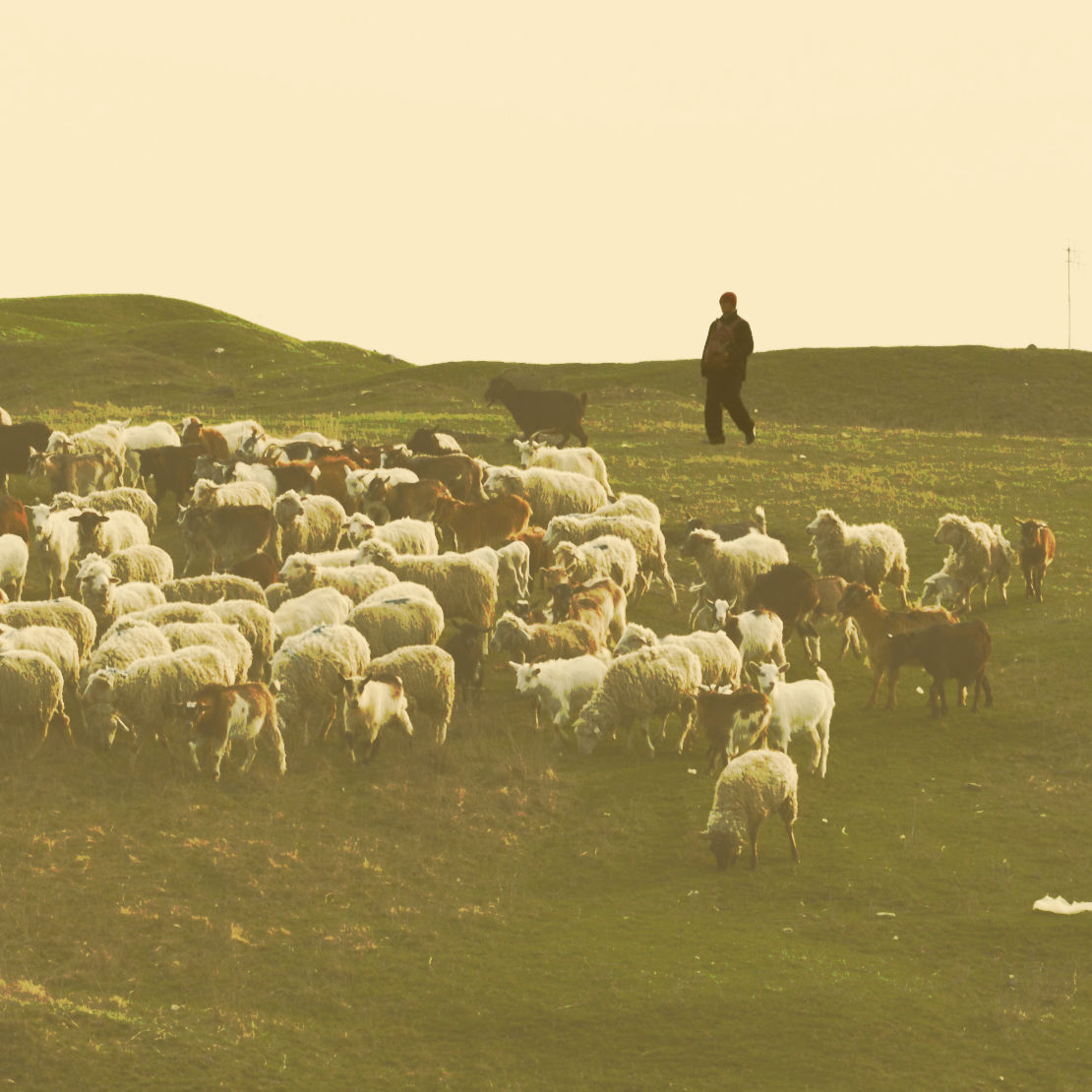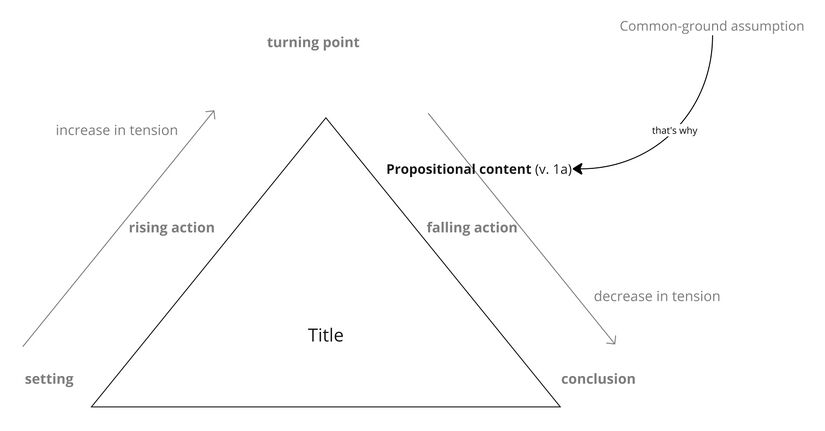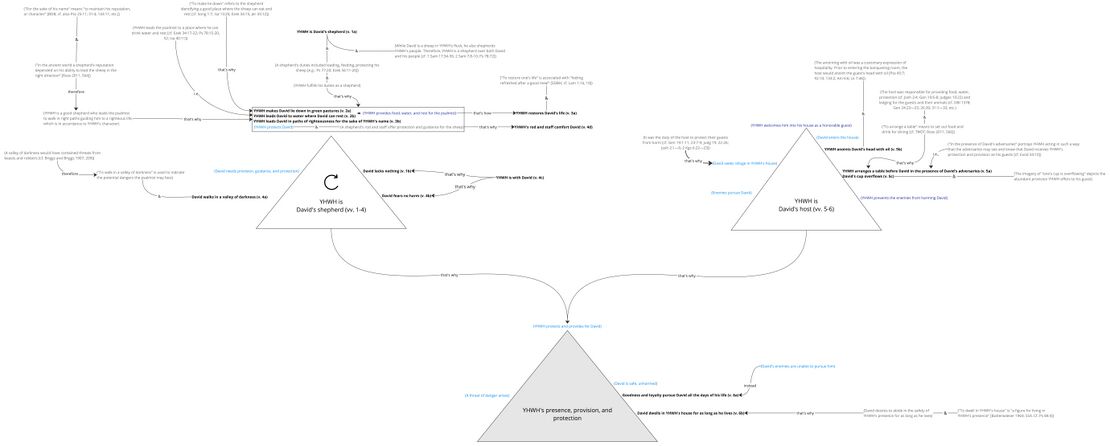Psalm 23 Story Behind
Guardian: Mari Strube
About the Story Behind Layer
The Story Behind the Psalm shows how each part of the psalm fits together into a single coherent whole. Whereas most semantic analysis focuses on discrete parts of a text such as the meaning of a word or phrase, Story Behind the Psalm considers the meaning of larger units of discourse, including the entire psalm.
The goal of this layer is to reconstruct and visualize a mental representation of the text as the earliest hearers/readers might have conceptualized it. We start by identifying the propositional content of each clause in the psalm, and then we identify relevant assumptions implied by each of the propositions. During this process, we also identify and analyze metaphorical language (“imagery”). Finally, we try to see how all of the propositions and assumptions fit together to form a coherent mental representation. The main tool we use for structuring the propositions and assumptions is a story triangle, which visualizes the rise and fall of tension within a semantic unit. Although story triangles are traditionally used to analyze stories in the literary sense of the word, we use them at this layer to analyze “stories” in the cognitive sense of the word—i.e., a story as a sequence of propositions and assumptions that has tension.
Summary Triangle
The story triangle below summarises the story of the whole psalm. We use the same colour scheme as in Participant Analysis. The star icon along the edge of the story-triangle indicates the point of the story in which the psalm itself (as a speech event) takes place. We also include a theme at the bottom of the story. The theme is the main message conveyed by the story-behind.
| Story Triangles legend | |
|---|---|
| Propositional content (verse number) | Propositional content, the base meaning of the clause, is indicated by bold black text. The verse number immediately follows the correlating proposition in black text inside parentheses. |
| Common-ground assumption | Common-ground assumptions[1] are indicated by gray text. |
| Local-ground assumption | Local-ground assumptions[2] are indicated by dark blue text. |
| Playground assumption | Playground assumptions[3] are indicated by light blue text. |
| The point of the story at which the psalm takes place (as a speech event) is indicated by a gray star. | |
| If applicable, the point of the story at which the psalm BEGINS to take place (as a speech event) is indicated with a light gray star. A gray arrow will travel from this star to the point at which the psalm ends, indicated by the darker gray star. | |
| A story that repeats is indicated by a circular arrow. This indicates a sequence of either habitual or iterative events. | |
| A story or event that does not happen or the psalmist does not wish to happen is indicated with a red X over the story triangle. | |
| Connections between propositions and/or assumptions are indicated by black arrows with small text indicating how the ideas are connected. | |
| Note: In the Summary triangle, highlight color scheme follows the colors of participant analysis. | |
Background ideas
Following are the common-ground assumptionsCommon-ground assumptions include information shared by the speaker and hearers. In our analysis, we mainly use this category for Biblical/Ancient Near Eastern background. which are the most helpful for making sense of the psalm.
- God is often referred to as the shepherd of his people (e.g., Pss 80:1; 95:7; 100:3; Isa 40:11). However, in Ps 23:1, YHWH is presented as David's personal shepherd; i.e., the one who leads, provides, and protects David.
- The anointing with a fine, spiced oil was a customary expression of hospitality. Prior to entering the banqueting room, the host would anoint the guest's head with oil (Pss 45:7; 92:10; 133:2; Amos 6:6; Luke 7:46).
- "You arrange a table" means to set out food and drink for dining (cf. TWOT; Ross 2011, 566; VanGemeren 2008, 255). This was a gesture of hospitality (Gen 18:1–8; Exod 2:18–20; Ps 78:19).
- It was the host's responsibility to provide food, water, and lodging for the guests and their animals (cf. DBI 1378; Gen 24:23—25; 26:30; 31:1—33; etc). The host was also responsible for providing protection to his guests from all enemies (cf. Briggs and Briggs 1906–1907, 210).
Background situation
The background situation is the series of events leading up to the time in which the psalm is spoken. These are taken from the story triangle – whatever lies to the left of the star icon.

Expanded Paraphrase
The expanded paraphrase seeks to capture the implicit information within the text and make it explicit for readers today. It is based on the CBC translation and uses italic text to provide the most salient background information, presuppositions, entailments, and inferences.
| Expanded paraphrase legend | |
|---|---|
| Close but Clear (CBC) translation | The CBC, our close but clear translation of the Hebrew, is represented in bold text. |
| Assumptions | Assumptions which provide background information, presuppositions, entailments, and inferences are represented in italics. |
| Text (Hebrew) | Verse | Expanded Paraphrase |
|---|---|---|
| מִזְמ֥וֹר לְדָוִ֑ד יְהוָ֥ה רֹ֝עִ֗י לֹ֣א אֶחְסָֽר׃ | 1 | A psalm written by David expressing confidence in YHWH's providence and protection. Like a sheep, I need a shepherd who knows my needs intimately so that he can meet them. I depend upon my shepherd because I cannot meet my needs on my own. Yet, I do not need to worry because YHWH is my shepherd; who provides for all of my needs. Therefore, I will never lack [anything]. When I need food, water, and a place to rest, |
| בִּנְא֣וֹת דֶּ֭שֶׁא יַרְבִּיצֵ֑נִי עַל־מֵ֖י מְנֻח֣וֹת יְנַהֲלֵֽנִי׃ | 2 | He makes a way for me to lie down in green pastures where I can eat and rest, and He leads me to water where I can drink and rest. |
| נַפְשִׁ֥י יְשׁוֹבֵ֑ב | 3 | He is a source of refreshment like no other; when I feel physically deprived of food, water, and rest, He restores my life by giving me nourishment. YHWH, my shepherd, is more than a provider, he is also a guide. I am not lost or aimless because He leads me securely where I should go. Life is fraught with conflict and trial, and the only safe path is following YHWH closely, pursuing righteousness. My security is that he leads me in paths of righteousness which enable me to live a righteous life. My confidence is in knowing that, ultimately, he does this not merely for my sake but, rather, for the sake of his name, because he receives honor when his servants pursue righteousness. His reputation, or name, benefits. He chooses paths that honor him and care for me, because he is a good shepherd. A "right path" does not necessarily mean a safe path. Sheep may need to go on dangerous paths on their way to pasture or water. The safety comes not from the path but from the shepherd's presence, because he protects his sheep. |
| גַּ֤ם כִּֽי־אֵלֵ֨ךְ בְּגֵ֪יא צַלְמָ֡וֶת לֹא־אִ֘ירָ֤א רָ֗ע כִּי־אַתָּ֥ה עִמָּדִ֑י שִׁבְטְךָ֥ וּ֝מִשְׁעַנְתֶּ֗ךָ הֵ֣מָּה יְנַֽחֲמֻֽנִי׃ | 4 | Therefore, Even when I walk in a valley of darkness under threat of predators and enemies, I will not fear harm, because you, YHWH, are with me. Your rod defends me against predators and your staff directs me, making it so I always know where to go: because they offer me both protection and guidance, they comfort me. |
| תַּעֲרֹ֬ךְ לְפָנַ֨י ׀ שֻׁלְחָ֗ן נֶ֥גֶד צֹרְרָ֑י דִּשַּׁ֖נְתָּ בַשֶּׁ֥מֶן רֹ֝אשִׁ֗י כּוֹסִ֥י רְוָיָֽה׃ | 5 | You care for me even more than a shepherd cares for his sheep, though. You treat me like an honored guest, whom you have chosen to invite under your protection, to provide for all my needs. You act like a gracious host: You arrange a table before me, setting out abundant food and drink. Like the shepherd who ensures both that the sheep eat and drink and also that they are protected from predators, you not only provide food and drink, but you do so in the presence of my adversaries — my enemies get to see your abundant provision for me! Not only can they not harm me, as long as I am under your protection, but they see and know that I am under your care. They would like to attack and defeat me, but you do the opposite: you treat me as an honorable guest: You have anointed my head with fine, spiced oil the way gracious hosts do, and now you fill the table with food and drink. In fact, you provide so much that I cannot even drink it all before you pour more wine. You provide so much that My cup is overflowing. |
| אַ֤ךְ ׀ ט֤וֹב וָחֶ֣סֶד יִ֭רְדְּפוּנִי כָּל־יְמֵ֣י חַיָּ֑י וְשִׁבְתִּי* בְּבֵית־יְ֝הוָ֗ה לְאֹ֣רֶךְ יָמִֽים׃* | 6 | With you as my shepherd and host, Surely your goodness and loyalty, instead of anything or anyone that could cause me harm, will pursue me all the days of my life, and I will dwell in YHWH's house, that is, I will continue to receive all the privileges and blessings of being your guest, in your presence, for as long as I live. |
There are currently no Imagery Tables available for this psalm.
Bibliography
- Alexander, Joseph Addison. 1864. Commentary on Psalms. Grand Rapids: Kregel Publications.
- Alter, Robert. 2019. The Hebrew Bible: The Writings. Vol. 3. New York: W.W. Norton & Company.
- Asumang, Annang. 2010. "The Presence of the Shepherd: A Rhetographic Exegesis of Psalm 23." Conspectus: The Journal of the South African Theological Seminary, vol. 9, no. 3: 1-24.
- Ayil, Ephraim S. "A Short Note on צלמות." Available at academia.edu. Pages 1-3.
- Barnes, Albert. 1869. Notes: Critical, Explanatory, and Practical on the Book of Psalms. Vol. 1. New York: Harper & Brothers Publishers.
- Barth, Jakob. 1889. Die Nominalbildung in den Semitischen Sprachen. Leipzig: J. C. Hinrichs'sche Buchhandlung.
- Botha, Phil. 2015. "The 'Tracks of Righteousness' of Psalm 23." Old Testament Essays. Vol.28, n.2: 283-300.
- Bratcher, Robert G., and William D. Reyburn. 1991. A Translator's Handbook on the Book of Psalms. New York: UBS Handbook Series.
- Briggs, Charles and Emilie Briggs. 1906. A Critical and Exegetical Commentary on the Book of Psalms. International Critical Commentary. New York: C. Scribner’s Sons.
- Bullock, C. Hassell. 2015. Psalms. Volume 1: Psalms 1-72. Teach the Text Commentary Series. Edited by Mark Strauss and John Walton. Grand Rapids: BakerBooks.
- Butler, James Glentworth. 1892. The Old Testament: Psalm I-LXXII. The Bible-Work. Vol 4. New York: Butler Bible-Work Company.
- Buttenwieser, Moses. 1969. The Psalms: Chronologically Treated with A New Translation. New York: KTAV Publishing House, INC.
- Craigie, Peter C. 2004. Word Biblical Commentary: Psalms 1–50. 2nd ed. Vol. 19. Nashville, TN: Nelson Reference & Electronic.
- Dahood, Mitchell J. 1966. The Anchor Bible: Psalms I, 1-50. Garden City, NY: Doubleday.
- Delitzsch, Franz Julius. 1883. A Commentary on the Psalms. New York: Funk and Wagnalls.
- Fokkelman, J. P. 2000. Major Poems of the Hebrew Bible: At the Interface of Hermeneutics and Structural Analysis. Studia Semitica Neerlandica. Assen, The Netherlands: Van Gorcum.
- Freedman, David Noel. 1980. Pottery, Poetry, and Prophecy: Studies in Early Hebrew Poetry. Winona Lake: Eisenbrauns.
- Futato, Mark D. 2008. "The Book of Psalms." In Cornerstone Biblical Commentary: The Book of Psalms, The Book of Proverbs. Vol 7. Carol Stream: Tyndale House Publishers.
- Gibson, J. C. L. ed. 1994. Davidson’s Introductory Hebrew Grammar: Syntax. Edinburgh, T. & T. Clark.
- Goldingay, John. 2006. Psalms: Psalms 1-41. Vol. 1. BCOT. Grand Rapids,MI: Baker Academic.
- Grosser, Emmylou. 2023. Unparalleled Poetry: A Cognitive Approach to the Free-Rhythm Verse of the Hebrew Bible. New York: Oxford University Press.
- Gunkel, Herman. 1998. An Introduction to the Psalms: The Genres of the Religious Lyric of Israel. Translated by James D. Nogalski. Macon, GA: Mercer University Press.
- Hossfeld, Frank-Lothar, and Erich Zenger. 2005. Psalms 2: A Commentary. Minneapolis: Fortress Press.
- Jacobson, Rolf A. 2014. “Psalm 23: You Are with Me.” Pages 238-246 in The Book of Psalms. Edited by Nancy L. DeClaissé-Walford, Rolf A. Jacobson, and Beth Laneel Tanner. Grand Rapids: William B. Eerdmans.
- Jennings, Arthur Charles, William Henry Lowe. 1848. The Psalms with Introductions and Critical Notes. London: Macmillan and Co.
- Keel, Othmar. 1997. The Symbolism of the Biblical World: Ancient Near Eastern Iconography and the Book of Psalms. Winona Lake: Eisenbrauns.
- Kidner, Derek. 1973. Psalms 1-72: An Introduction and Commentary. Downers Grove: InterVarsity Press.
- Kirkpatrick, Alexander F. 1906. The Book of Psalms. London: Cambridge University Press.
- Kissane, Monsignor Edward J. 1953. The Book of Psalms: Translated from A Critically Revised Hebrew Text. Vol. 1. Maryland: The Newman Press.
- Koehler, Ludwig. 1956. "Psalm 23." Zeitschrift für die alttestamentliche Wissenschaft 68, no. 2: 227-234.
- König, Ekkehard. 2006. "Concessive Clauses." In Brown, K. (ed). The Encyclopedia of Language and Linguistics. 2nd Ed. Vol. 2. Amsterdam: Elsevier. 819-824.
- Kraus, Hans-Joachim. 1988. Psalms 1–59. Minneapolis: Fortress.
- Lange, John P. and Philip Schaff. 1872. A Commentary on the Holy Scriptures: Critical, Doctrinal, and Homiletical. Vol. IX of the Old Testament Containing the Book of Psalms. New York: Scriber.
- Locatell, Christian S. 2017. "Grammatical Polysemy in the Hebrew Bible: A Cognitive Linguistic Approach to כי." Stellenbosch University.
- Lugt, Pieter van der. 2006. Cantos and Strophes in Biblical Hebrew Poetry: With Special Reference to the First Book of the Psalter. Vol. 1. 3 vols. Oudtestamentische Studiën 53. Leiden: Brill.
- Lunn, Nicholas P. 2006. Word-Order Variation in Biblical Hebrew Poetry: Differentiating Pragmatics and Poetics. Paternoster Biblical Monographs. Milton Keynes: Paternoster.
- Malone, Andrew S. 2009. "God the Illeist: Third-Person Self-References and Trinitarian Hints in the Old Testament." Journal of the Evangelical Theological Society 52, pp. 499-518.
- Miller, Patrick D. 1986. Interpreting the Psalms. Philadelphia: Fortress Press.
- Morgenstern, Julian. 1946. "Psalm 23." Journal of Biblical Literature 65, no. 1: 13–24.
- Pardee, Dennis. 1990. "Structure and meaning in hebrew Poetry: The Example of Psalm 23." MAARAV 5-6, Vols. 5-6, 239-280.
- Perowne, J. J. Stewart. 1870. The Book of Psalms: A New Translation with Introductions and Notes, Explanatory and Critical. Vol. I. London: Bell and Daldy.
- Power, E. 1928. “The Shepherd's Two Rods in Modern Palestine and in Some Passages of the Old Testament." Biblica 9, no. 4: 434–42. available at jstor.
- Ross, Allen P. 2011. A Commentary on the Psalms 1-41. Vol. 1. Grand Rapids, MI: Kregel.
- Ross, William A., and Elizabeth Robar. eds. 2023. Linguistic Theory and the Biblical Text. Cambridge, UK: Open Book Publishers.
- Schaefer, Konrad. 2001. Psalms. Berit Olam Studies in Hebrew Narrative and Poetry. Collegeville, MN: The Liturgical Press.
- Schökel, Luis Alonso. 1992. Salmos I (Salmos 1-72): Traducción, Introducciones y Comentario. Navarra: Verbo Divino.
- Schoors, A. 1981. "The Particle כי." Oudtestamentische Studiën. Leiden: E. J. Brill. pp. 240-276.
- Smith, Mark S. 1988. "Setting and Rhetoric in Psalm 23." Journal for the Study of the Old Testament, 13 (41), 61-66.
- Spurgeon, Charles H. The Treasury of David. Available at The Spurgeon Archive.
- Stone, Anthony P. 2006. “Does 'Shadow of Death' Mean 'Deep Darkness'?” Biblical Research: 53-57.
- Tov, Emmanuel Tov. 2015. The Text-Critical Use of the Septuagint in Biblical Research. Winona Lake: Eisenbrauns.
- Van Peursen, Willem Th. 2017. The Verbal System in the Hebrew Text of Ben Sira. Leiden, The Netherlands: Brill.
- VanGemeren, Willem. 2008. Psalms: The Expositor's Bible Commentary. Grand Rapids: Zondervan.
- Walton, John H. 2009. The Minor Prophets, Job, Psalms, Proverbs, Ecclesiastes, Song of Songs. Zondervan Illustrated Bible Backgrounds Commentary: Old Testament. Vol. 5. Grand Rapids: Zondervan.
- Williams, Ronald J. 1967. Hebrew Syntax: An Outline. University of Toronto, Canada.
- Wilson, Gerald H. 2002. The NIV Application Commentary: Psalms. Vol. 1. Grand Rapids: Zondervan.
Footnotes
- ↑ Common-ground assumptions include information shared by the speaker and hearers. In our analysis, we mainly use this category for Biblical/ANE background - beliefs and practices that were widespread at this time and place. This is the background information necessary for understanding propositions that do not readily make sense to those who are so far removed from the culture in which the proposition was originally expressed.
- ↑ Local-ground assumptions are those propositions which are necessarily true if the text is true. They include both presuppositions and entailments. Presuppositions are those implicit propositions which are assumed to be true by an explicit proposition. Entailments are those propositions which are necessarily true if a proposition is true.
- ↑ Whereas local-ground assumptions are inferences which are necessarily true if the text is true, play-ground assumptions are those inferences which might be true if the text is true.








